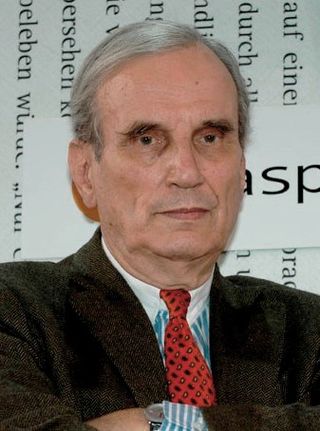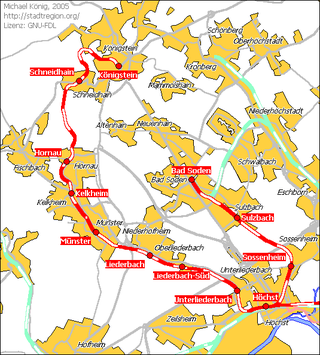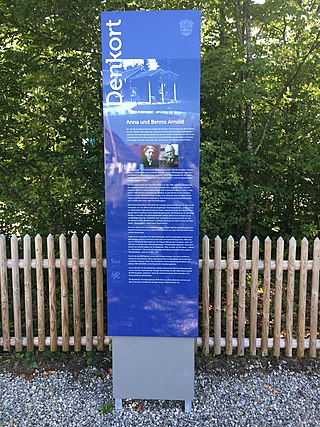
Joachim Clemens Fest was a German historian, journalist, critic and editor who was best known for his writings and public commentary on Nazi Germany, including a biography of Adolf Hitler and books about Albert Speer and German resistance to Nazism. He was a leading figure in the debate among German historians about the Nazi era. In recent years his writings have earned both praise and strong criticism.

Dresdner Bank AG was a German bank and was based in Frankfurt. It was one of Germany's largest banking corporations and was acquired by competitor Commerzbank in May 2009.

Commerzbank AG is a major German bank operating as a universal bank, headquartered in Frankfurt am Main. In the 2019 financial year, the bank was the second largest in Germany by the total value of its balance sheet. Founded in 1870 in Hamburg, the bank is today present in more than 50 countries around the world and provides almost a third of Germany's trade finance. In 2017, it handled 13 million customers in Germany and 5 million customers in Central and Eastern Europe. Commerzbank is a member of the Cash Group. 15% of the shares are owned by the Federal Republic of Germany and 85% are in free float.

Königstein im Taunus is a health spa and lies on the thickly wooded slopes of the Taunus in Hesse, Germany. The town is part of the Frankfurt Rhein-Main urban area. Owing to its advantageous location for both scenery and transport on the edge of the Frankfurt Rhine Main Region, Königstein is a favourite residential town. Neighbouring places are Kronberg im Taunus, Glashütten, Schwalbach am Taunus, Bad Soden am Taunus and Kelkheim.

Aryanization was the Nazi term for the seizure of property from Jews and its transfer to non-Jews, and the forced expulsion of Jews from economic life in Nazi Germany, Axis-aligned states, and their occupied territories. It entailed the transfer of Jewish property into "Aryan" or non-Jewish, hands.
The Freundeskreis der Wirtschaft, or Circle of Friends of the Economy was a group of German industrialists whose aim was to strengthen the ties between the Nazi Party and business and industry. The group was formed and co-ordinated by Wilhelm Keppler, one of Adolf Hitler's close economic advisors.
Robert Max Wasilii Kempner was a German lawyer who played a prominent role during the Weimar Republic and who later served as assistant U.S. chief counsel during the International Military Tribunal at Nuremberg. Kempner studied law at the University of Freiburg and served as a public prosecutor in Berlin during the 1920s. In 1928, he was appointed chief legal adviser in the Prussian Ministry of the Interior. In this role he sought to prosecute Adolf Hitler for high treason and to ban the Nazi Party.
The Industrielleneingabe was a petition signed by 19 representatives of industry, finance, and agriculture on November 19, 1932 that requested for German President Paul von Hindenburg to make Adolf Hitler the German Chancellor.
Martin Blessing is a German banker and business person.

Falkenstein Castle, also called New Falkenstein (Neu-Falkenstein), is a ruined hill castle at 450 m above sea level (NHN) in the eponymous climatic spa of Falkenstein, a quarter of Königstein im Taunus in the county of Hochtaunuskreis in the German state of Hesse.

The Königstein Railway is a 1902 opened, single-track and non-electrified secondary railway line that connects the town of Königstein im Taunus with the city of Frankfurt am Main on the southern edge of the Taunus in the German state of Hesse.

The Holocaust in the Sudetenland resulted in the flight, dispossession, deportation and ultimately death of many of the 24,505 Jews living in the Reichsgau Sudetenland, an administrative region of Nazi Germany established from former Czechoslovak territory annexed after the October 1938 Munich Agreement. Due to harassment and violence, including during Kristallnacht, ninety percent of the Jews had already left the Sudetenland by mid-1939. The remaining Jews were subject to property confiscation and eventually deportation. During the later years of the war, tens of thousands of Jews and non-Jews were forced laborers in a network of concentration camps in the Sudetenland.

The Central Office for Jewish Emigration in Prague, reformed in 1942 as the, was part of the Central Office for Jewish Emigration.
Adolf Weinmüller was a German art dealer and Nazi party member who trafficked in looted art and Aryanized the S. Kende auction house as well as Helbing. The catalogs of his auctions were published in 2014 for provenance research and restitution to victims.
Friedrich Maximilian Welz was an Austrian art dealer and Nazi party member investigated for art looting.
Willy Dreyfus was a Swiss banker of German-Jewish origin.

Ludwig Katzenellenbogen was a German brewery director deported by the Nazis to the Sachsenhausen concentration camp
Bankhaus Adolph Meyer was a private bank, and the oldest in Hanover, Germany. It played a prominent role in the industrialization of Lower Saxony, particularly in the cotton and coal and steel industries, especially since the time of the Kingdom of Hanover. During the Nazi era, it was "Aryanized". It is now located on Schillerstraße at the corner of Rosenstraße in Hannover's Mitte district.
Georg Karg was a German businessman in the department store industry. After rising in the employ of the Hermann Tietz Department Stores, Karg took over the company when it was Aryanized, that is forcibly transferred to non-Jewish owners under the Nazis. After the Jewish owners were forced out, Karg was appointed managing director, running the stores under the name Hertie.

Benno Arnold was a German Jewish textile industry entrepreneur in Augsburg who was murdered in the Holocaust.











